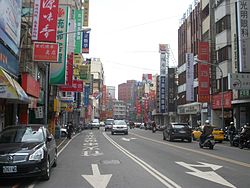Fengyuan District
|
Fengyuan 豐原區 |
|
|---|---|
| District | |
| Fengyuan District | |
 |
|
 |
|
| Coordinates: 24°15′N 120°43′E / 24.250°N 120.717°ECoordinates: 24°15′N 120°43′E / 24.250°N 120.717°E | |
| Country | Taiwan |
| Special municipality | Taichung |
| Area | |
| • Total | 41.1845 km2 (15.9014 sq mi) |
| Population (January 2016) | |
| • Total | 166,729 |
| • Density | 4,031/km2 (10,440/sq mi) |
| Website | Fengyuan District |
| Fengyuan District | |||||||||||||
| Traditional Chinese | 豐原區 | ||||||||||||
|---|---|---|---|---|---|---|---|---|---|---|---|---|---|
|
|||||||||||||
| Alternative Chinese name | |||||||||||||
| Traditional Chinese | 葫蘆墩 | ||||||||||||
|
|||||||||||||
| Transcriptions | |
|---|---|
| Standard Mandarin | |
| Hanyu Pinyin | Fēngyuán Qū |
| Tongyong Pinyin | Fongyuán Cyu |
| Southern Min | |
| Hokkien POJ | Hong-goân-khu |
| Transcriptions | |
|---|---|
| Southern Min | |
| Hokkien POJ | Hô͘-lô͘-tun |
Fengyuan District (Chinese: 豐原區) is a district located in north-central Taichung, Taiwan on the south bank of the Dajia River. Fengyuan district is the third most populated district among former Taichung County, ranking after Dali and Taiping district. Fengyuan is recognized as Huludun in early times, meaning "gourd" in Chinese, for a gourd-shape pile of mud was found in Fengyuan by the aborigines. The rice yielded from Fengyuan is famous for its high quality and the bakery industry prospered in later decades. Because of the extraordinary location of the intersection of Taiwan railway west trunk and Dongshi branch line, Fengyuan quickly expanded after World War II. It soon became one of the political, economical and communication centers of central Taiwan, playing an important role in the development of the central part of this island. Recently, Fengyuan faces the challenge of being marginalized after the amalgamation of Taichung County and Taichung City in December 2010.
Before the arrival of the Han Chinese, the area of Fengyuan city was inhabited by Taiwanese aborigines. Their name for the area, meaning "thriving pine forest", which was transcribed into Chinese characters as 泰耶爾墩. Before the mid-18th century, the area was a territory of the Pazeh people, which they called Haluton. This name was adapted into Hokkien as Holotun (Chinese: 葫蘆墩; Pe̍h-ōe-jī: Hô͘-lô͘-tun; literally: "gourd mound").
Han immigration to the area began during late Qing rule. Liu Mingchuan gave the area a nickname of "little Suzhou" due to its prosperity and scenic beauty.
...
Wikipedia
